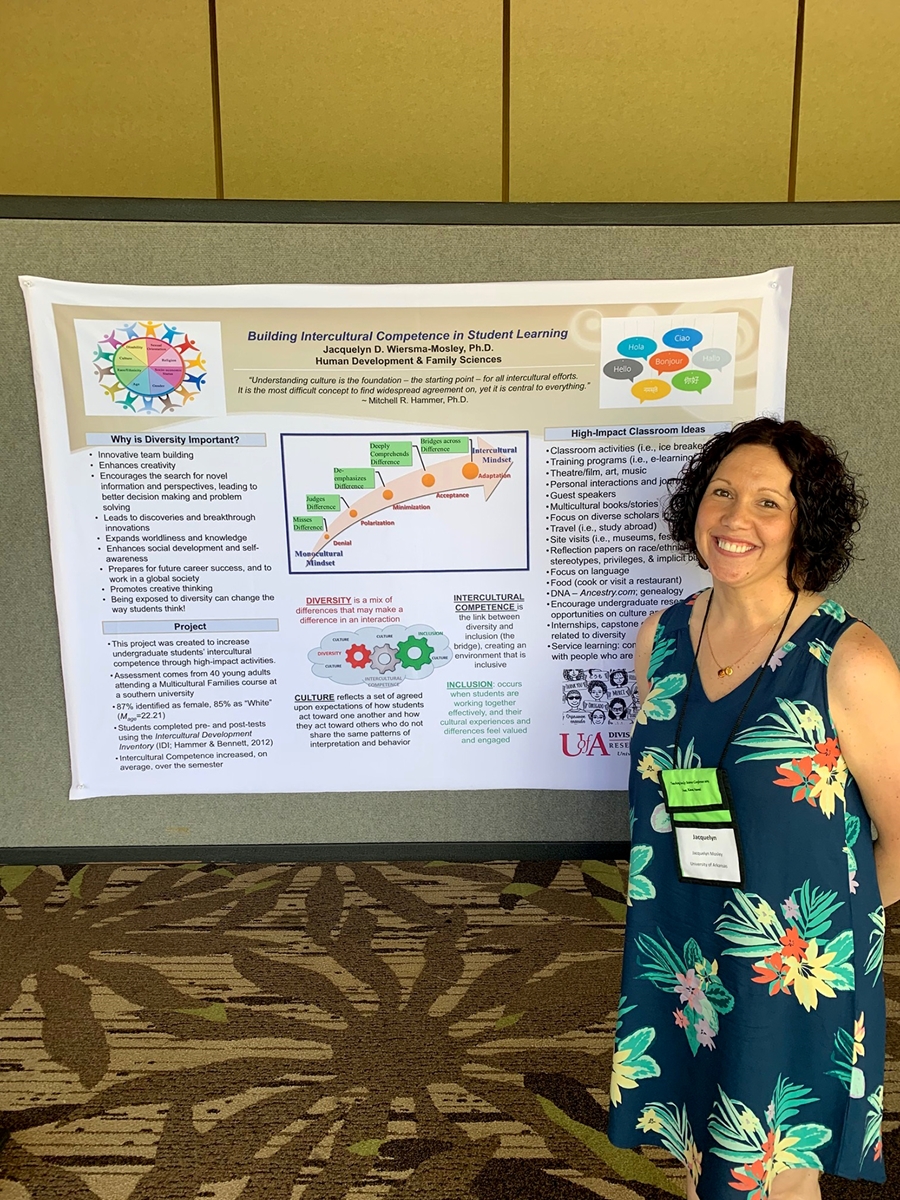
FAYETTEVILLE, Ark. – Addressing intercultural competence is an emphasis for the U of A's School of Human Environmental Sciences, and Jacquelyn Wiersma-Mosley is using a grant from the Wally Cordes Teaching and Faculty Support Center to raise diversity awareness and cultural appreciation.
Intercultural competence can be defined as an awareness of one's own cultural identity and the ability to interact effectively and appropriately with people from other cultures. Cultural competency is important to effectiveness in a variety of areas, including health care, education, public services, law enforcement, libraries, customer service and other business functions.
Wiersma-Mosley, an associate professor and researcher in the human development and family sciences program, has completed training to become an Intercultural Development Inventory administrator. IDI, which has been used in more than 30 countries, and in corporate, government, educational, non-profit and faith-based contexts, breaks up intercultural experiences into areas of:
- Cross-cultural goals
- Challenges faced when navigating cultural differences
- Intercultural incidents faced when encountering cultural differences
- Ways used to navigate those cultural differences
Wiersma-Mosley has students in her Multicultural Families class select realistic choices from a Multicultural Activity Menu, which she created, and they earn points for choosing options such as trying new foods, listening to music, attending festivals or other cultural-specific experiences.
"In this lesson, students can pick and choose assignments that excite them, challenge them and are most easily woven into their everyday lives," said Mosley. "A trained administrator can help individuals learn about their current and perceived intercultural competence, while also creating specific goals to increase their competency over time."
She presented findings on intercultural competence at a human development and family sciences meeting in June (Teaching Family Science Conference) and is presenting her Multicultural Activity Menu at the "Are We HIP and Well Enough?" conference focused on the High Impact Practices (HIPs) and wellness/wellbeing practices used at the U of A on July 31 in the Donald W. Reynolds Center for Enterprise Development.
Wiersma-Mosley has worked with honors and graduate students in human environmental sciences, will assess students entering the U of A through the Razorgrad Institute for Success and Engagement Program as well as faculty attending the Teacher Education Summit in August.
She is developing and teaching a course next spring on Introduction to Cultural Competence. Anyone interested in the class or IDI assessments can contact her at jwiersma@uark.edu.
About the Dale Bumpers College of Agricultural, Food and Life Sciences: Bumpers College provides life-changing opportunities to position and prepare graduates who will be leaders in the businesses associated with foods, family, the environment, agriculture, sustainability and human quality of life; and who will be first-choice candidates of employers looking for leaders, innovators, policy makers and entrepreneurs. The college is named for Dale Bumpers, former Arkansas governor and longtime U.S. senator who made the state prominent in national and international agriculture. For more information about Bumpers College, visit our website, and follow us on Twitter at @BumpersCollege and Instagram at BumpersCollege.
About the University of Arkansas: The University of Arkansas provides an internationally competitive education for undergraduate and graduate students in more than 200 academic programs. The university contributes new knowledge, economic development, basic and applied research, and creative activity while also providing service to academic and professional disciplines. The Carnegie Foundation classifies the University of Arkansas among only 2.7 percent of universities in America that have the highest level of research activity. U.S. News & World Report ranks the University of Arkansas among its top American public research universities. Founded in 1871, the University of Arkansas comprises 10 colleges and schools and maintains a low student-to-faculty ratio that promotes personal attention and close mentoring.
Topics
Contacts
Robby Edwards, director of communications
Dale Bumpers College of Agricultural, Food and Life Sciences
479-575-4625,